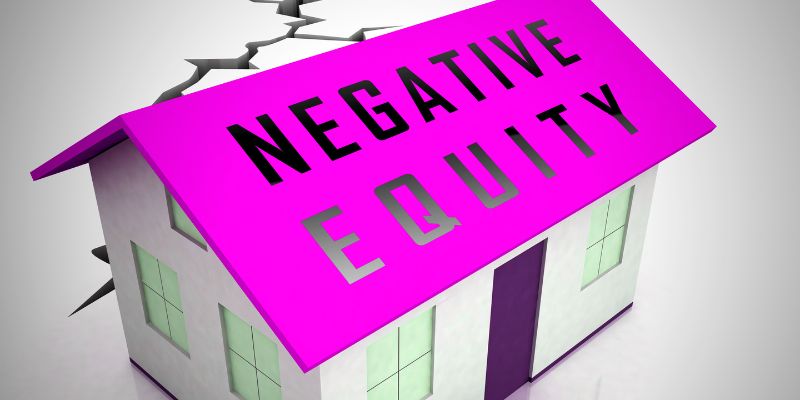The real estate market is known for its ups and downs, and sometimes homeowners find themselves in a tough situation when they need to sell their property for less than they owe on their mortgage. This situation, known as negative equity, can arise due to various factors, including falling property prices, overpaying for a property, property damage, high loan-to-value ratios, and difficulty navigating. This comprehensive guide will explore the causes of negative equity, the options available to homeowners, and the potential consequences. Whether you're facing this dilemma or want to be prepared, read on to learn how to handle selling your home in a negative equity scenario.

Options for Selling Your Home with Negative Equity
Selling a home with negative equity can be challenging, but several strategies are available to homeowners facing this situation. Let's delve into these options in detail:
Do a Short Sale:
Homeowners facing financial struggles and unable to keep up with mortgage payments may consider a short sale, which entails selling their home for an amount below the remaining balance on the loan. This option requires approval from the lender.
How it works:
- Contact Lender: Express intention to pursue a short sale.
- Prove Financial Hardship: Provide documentation indicating your incapacity to fulfill payments caused by job loss, medical bills, or divorce.
- Market Property: List property often at a lower price than what you owe on the mortgage.
- Lender Approval: Once the buyer is found needs permission of the lender because they will incur loss, making this process time-consuming.
- Closing The Sales: If the bank agrees, the transaction proceeds, and ownership changes.
Pros:
- Avoid foreclosure: Short sales can prevent foreclosure and its adverse impact on your credit rating and financial stability.
- Debt forgiveness: In certain cases of short sale, lenders may waive the remaining mortgage debt, resulting in freedom from any future financial obligations.
- Relatively better credit impact: A short sale will hurt your credit score less severely than a foreclosure.
Cons:
- Credit implications: In the short term, your credit score will be affected negatively, making it difficult to obtain new credit.
- Lengthy process: Such short sales may take a long time to be approved and require patience for the process to reach its conclusion.
- Tax consequences: Short sales may be taxable income due to forgiven debt, which could bring tax obligations.

Pay the Difference:
If the difference between your mortgage and home value is insignificant, you can pay it yourself.
How It Works:
- Determine shortfall: Determine the difference between your mortgage and what your house sells for in today’s market.
- Use personal funds: This deficit can be covered with savings or other personal resources.
- Sell assets: Other options are selling investments, vehicles, or valuable possessions that will bring enough money to bridge the financial gap.
- Personal loan alternative: Taking out a personal loan may also be an option for covering this cost.
Pros:
- Immediate resolution: It is easy to pay the difference and solve your negative equity situation instantly.
- Maintained credit: This option, like short sales or foreclosures, does not harm your credit score.
Cons:
- Financial strain: Trying to cover the shortfall may require draining your savings or more debt that would strain your finances.
- Limited resources: You may need more personal funds or assets to cover the difference based on your financial standing.
Increase the Property Value:
To boost your home’s market value and bridge the gap between the mortgage owed and the actual worth, consider improving its condition and overall quality.
How It Works:
- Necessary Repairs: Begin by pinpointing any necessary repairs or upgrades that could attract potential buyers.
- Assess needed repairs: Evaluate fixes to see if certain enhancements can increase property value.
- Budget and plan: Develop a budget for renovations and define the timeline of the work.
- Execute renovations: Repair and improve as much as possible, concentrating on those aspects that could provide the best return on investment.
- Reap the benefits: After completing the improvements, your home's market value should increase, enabling you to sell at or above your mortgage balance.
Pros:
- Increased property value: Increased property value after renovation which makes it more attractive buyers-wise
- Better marketability: A well-maintained and newly developed home usually attracts more potential buyers and sells faster.
- Profit potential: If the enhancements significantly raise the price of your home, you could even make money on resale.
Cons:
- Upfront costs: Renovations also call for funds upfront, which you may need to finance using your money or loans.
- Time-consuming: This can lead to a long renovation process that may delay your ability to sell the property.
- Market fluctuations: Market conditions may also change, making it impossible to bridge the negative equity gap through renovations fully.
Build More Equity:
To increase your equity, consider staying in your home and making regular mortgage payments if the local real estate market is stable or improving.
How It Works:
- Assess market conditions: Check if your local real estate market is stable or showing signs of improvement.
- Continue mortgage payments: Make your regular mortgage payments to reduce the balance of your loan.
- Make extra payments: Ways to increase your equity include making additional payments towards the principal balance whenever possible.
- Monitor market trends: For this reason, pay attention to local market trends and property values to determine when it is a good time to sell without negative equity.
Pros:
- Improved equity: Living in your house and building equity over time can position you to sell without loss.
- No immediate credit impact: Unlike short sales or foreclosure, there is no immediate negative impact on your credit if you continue paying your mortgage.
Cons:
- Patience required: Acquiring equity by making mortgage payments monthly or biannually is a lengthy process and requires patience.
- Market uncertainty: Market conditions may shift, and it is not necessarily so that your home's value will appreciate enough to eliminate negative equity.
Conclusion
Selling your home for less than what you owe can be difficult, so knowing the alternatives and possible repercussions can be a sound strategy. To deal with negative equity effectively, seeking professional assistance - whether through a short sale or alternative methods like paying the difference -- is highly recommended. With well-informed decisions supported by expert guidance, you'll have greater confidence in securing your financial future amidst real estate market fluctuations.




